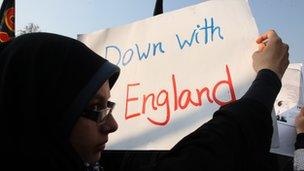Iran's battle for TV influence takes shape on Press TV
- Published

The attack on the British embassy in Tehran and the expulsion of Iranian diplomats from London propelled UK-Iranian engagement into the deep freeze. But in the world of television, relations have been frosty for some time.
Press TV is a glossy, English-medium channel that comes under the umbrella of Iran's state broadcaster, the IRIB. In the UK it is available on the Sky satellite service.
The station's high-profile presenters include the former MP George Galloway and, until earlier this year, it counted on the services of the former London Mayor, Ken Livingstone.
Press TV Ltd in London sells programmes to Iran, mainly talk shows, and Press TV International in Tehran produces most of the news and documentaries.
When Press TV launched in 2007, its stated aim was to give Western audiences what it called "a second eye".
It is pro-Palestinian, anti-sanctions against Iran, and critical of Western - especially US and UK - foreign policy.
Arrested for 'spying'
But in the UK, the channel has come under scrutiny. Earlier this month Press TV was fined £100,000 by the broadcasting regulator Ofcom, who upheld a complaint by Maziar Bahari.
A journalist and film-maker of Iranian origin, Bahari was in Iran in 2009 covering the presidential election for Channel 4 News and Newsweek magazine.
He filmed the demonstrations that followed the contested election.
Then he was arrested, accused of being a spy, held in solitary confinement and interrogated.
Bahari was told that if he did a television interview according to a pre-agreed script, he would be released.
He says one of the crews who came to film the "interview" was from Press TV.
"My interrogator's boss wrote the scenario and it was divided into questions and answers. The reporters asked the questions and I gave the answers, so we were basically reading from the same sheet," he told Radio 4's The Report.
When Press TV aired a report claiming the Western media's coverage of the demonstrations was biased, they included a clip from Bahari's prison interview.
Once he was released after 180 days in jail, he returned to the UK and made a complaint to Ofcom.
He claimed the airing of part of the interview by Press TV had breached broadcast rules on fairness and privacy. Ofcom agreed.
Farooq Bajwa, a solicitor who acts for Press TV, says the channel realises interviewing prisoners under arrest is not ideal.
"The fine is something Press TV can live with," he says.
"But I think it may help reinforce the image amongst Press TV supporters that in fact Ofcom is treating Press TV more harshly than it might have treated other news channels."
He points to one of the US embassy cables from February 2010 that was released by Wikileaks.
"Her Majesty's government is exploring ways to limit the operations of the Islamic Republic of Iran Broadcasting's Press TV service, which operates a large bureau - over 80 staff - in London," it read.
'Being watched'
Mr Bajwa believes this is evidence that Press TV in the UK is under suspicion.
"We know from Wikileaks that in fact the British government has discussed Press TV at the highest level with their American counterparts.
"So to pretend that it is just another channel in the same way that you might look at a French or German channel just isn't credible.
"Press TV is obviously viewed differently. That means it is watched like a hawk."
Inside Iran there is no doubt that the authorities are watching the BBC's Persian television, according to its head, Sadeq Saba.
"The Iranians have been jamming BBC Persian television on and off for the last three years.
"Now Iran targets certain programmes. A couple of months ago we made a documentary about Ayatollah Khamenei, Iran's supreme leader, and they started jamming it on all satellites.
"So it's become 'intelligent' jamming - they jam programmes they think are most harmful to them," he said.
Bahari thinks the jamming of BBC Persian in Iran is a good argument for taking Press TV off the air in the UK.
"I think it should be banned at least because of reciprocity. People who are working for BBC Persian in Iran can be charged with espionage, they can be incarcerated, they can even be executed."
Sadeq Saba understands why some people feel strongly.
"I sympathise with people who say something must be done because the BBC is not allowed to operate in Iran and Press TV is operating in London," he says.
"In Iran the BBC has no bureau, this is an anomaly. We could easily jam Iran, but we never do that because we believe in freedom of expression."
But Abbas Edalat, from the Campaign Against Sanctions and Military Intervention in Iran, says it is unfair to compare the jamming of the BBC in Iran with any proposal to take Press TV off the air in the UK.
"The Iranian authorities see themselves in a state of siege," he says.
"They are surrounded by US military bases, they are threatened with military attack, and there are covert military operations in Iran.
"None of these things exist for the UK. So it is not an equal situation."
With diplomatic relations between the UK and Iran on ice, and tensions high across the Middle East, all television will inevitably find its output subject to scrutiny and debate.
The Report is on BBC Radio 4 on Thursday 29 December at 20:00 GMT. Listen to the full programme via the Radio 4 website or download the programme podcast.
- Published6 September 2023
- Published20 August 2015
- Published29 November 2011
- Published22 December 2011